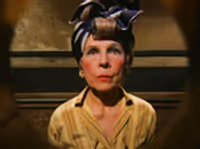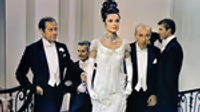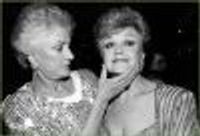Arena Stage "Music Man"-set in the 1930's...
#26Arena Stage
Posted: 5/23/12 at 9:50amLord, please spare us from idiots who believe they're geniuses.
#27Arena Stage
Posted: 5/23/12 at 9:54amIt looks absolutely dreary.
#28Arena Stage
Posted: 5/23/12 at 9:57am
It does look drab.
And is the whole show supposed to look like it's being performed in a gymnasium? Is that part of the concept.
#29Arena Stage
Posted: 5/23/12 at 10:01am
I think people should have to take a test for a "creative license," not unlike a DMV exam.
So many would fail before they got out of the parking lot.
So many others would be arrested for reckless driving.
blocked: logan2, Diamonds3, Hamilton22
ThankstoPhantom
Broadway Legend Joined: 10/13/05
#30Arena Stage
Posted: 5/23/12 at 10:52amb12, you hit it on the head. It is actually irresponsible to take ideologies from a different time period and place them in another, especially when both time periods are realistic. Sorry, I'm not sorry, but it's really disrespectful to the writer, who, has previously posted, dictates to directors to honor the historicity of the piece.
#31Arena Stage
Posted: 5/23/12 at 11:12amExactly, but we've all met our share of dopey directors who think they can write the show better than the writers.
#32Arena Stage
Posted: 5/23/12 at 1:55pm
Well, shoot me, but I enjoyed every minute of it. ![]() The acting was good all around, the choreography was fantastic, and the energy was consistently strong. The costumes at the beginning are a bit drab, but they get a lot brighter and more colorful later on. Although of course the shift in time period feels a little odd, they don't make a huge deal out of it. The only costume choice that I thought was REALLY off was putting Marian in pants for "Marian the Librarian."
The acting was good all around, the choreography was fantastic, and the energy was consistently strong. The costumes at the beginning are a bit drab, but they get a lot brighter and more colorful later on. Although of course the shift in time period feels a little odd, they don't make a huge deal out of it. The only costume choice that I thought was REALLY off was putting Marian in pants for "Marian the Librarian."
(And no, I'm not on the board. ![]() )
)
#33Arena Stage
Posted: 5/23/12 at 6:44pmmost of the people on here who are readying their pitchforks will not actually see the production, but are judging based on a few pictures, clips, and an admittedly misguided directorial concept. calm down, guys. the music man is a strong enough show to practically be director-proof, and while setting it in the 30's was a silly idea, it's far from the travesty people are making it out to be. it's still a very charming and entertaining evening, and judging from the way the audience went wild at the end, as well as comments i overheard during intermission and afterward, i wasn't the only one who felt that way.
Gracie2
Swing Joined: 5/23/12
#36Arena Stage
Posted: 5/23/12 at 8:44pmThat video doesn't make me want to see it any more than I already don't want to see it.
#37Arena Stage
Posted: 5/23/12 at 10:31pm
I just don't get the '30s aspect. It's unnecessary and distracting. That video looks like a hoedown for "The Grapes of Wrath."
The lyrics to "Ya Got Trouble" include mentions of Dan Patch, Bevo, Sen-Sen, etc. All of them early 20th century references. Do they just let Harold Hill sound three decades out of fashion?
What about the anvil salesman, Charlie Cowell, going from town to town in a world that would now be full of "horseless carriages." Not exactly a great thing to be selling door to door.
blocked: logan2, Diamonds3, Hamilton22
#38Arena Stage
Posted: 5/23/12 at 10:46pmIsn't that choreography more standard 20s stuff? I mean I guess they probably would do similar moves during the 30s, but... Odd.
#39Arena Stage
Posted: 5/23/12 at 10:53pm
the way i see it, since theatre is a medium that doesn't deal in exact verisimilitude, there is a certain amount of flexibility allowed in the interpretations of these shows, especially the classics. obviously the specifics of what can reasonably be changed vary from show to show, but i don't think that adding twenty years or so to the original setting of the music man is enough to compromise the integrity of the material. there are references to 1912 america, yes, but i'm sure most audience members won't recognize them as anachronistic and it'll just go over their heads as generally antiquated. i doubt there are many people outside this board that are up in arms over the exact dates that the wells fargo wagon ran. there have been plenty of 100% literal productions, including the excellent film version, and i'm sure there will be plenty more.
i'm not advocating tweaking material or imposing crazy directorial concepts just for the sake of doing something different with a well-known piece-- which very well could be the impetus for this production, who knows-- but sometimes those changes can illuminate something about the work that wasn't obvious in other incarnations. do i think that changing the period of this production improved it? no, not really. do i think it was an egregious mishandling of the material? not at all. i don't think exploring different ways to present a show, and this show in particular, is inherently a crime, which seems to be the consensus of this thread. at the end of the day, it's still the same book and the same score as it always is, the wrapper is just a little different. but whether it is successful or not is ultimately a matter of personal opinion.
Updated On: 5/23/12 at 10:53 PM
#40Arena Stage
Posted: 5/23/12 at 10:57pmI see your point, but then my question is if most audiences won't realize whatsoever--then why do it? it seems to make it even more pointless of an ecercise...
#41Arena Stage
Posted: 5/23/12 at 10:58pm
there are references to 1912 america, yes, but i'm sure most audience members won't recognize them as anachronistic and it'll just go over their heads as generally antiquated.
Yes, it's always a good idea to insult the intelligence of your audience. Start with that approach and work your way down.
And Eric, there were several Charleston steps there ... which is a 1920s dance craze.
In the original production, Onna White put the Castle Walk into Shapoopi. Even though that was perfect for the period (it was a dance introduced by Vernon and Irene Castle), she shouldn't have bothered. Nobody would probably get that anyway. The show came out in 1957, so she just should have had them jitterbug instead.
blocked: logan2, Diamonds3, Hamilton22
#42Arena Stage
Posted: 5/23/12 at 11:05pmRight, I was thinking of the Charlestan in particular which small town America very well likely may have been doing regularly in the 1930s, but it just immediately screams 1920s to me (and I'd assume a lot of people).
#43Arena Stage
Posted: 5/23/12 at 11:09pm
I suppose some were still doing the Charleston in the early 1930s.
By the mid-30s the Jitterbug took over, and it was THE popular dance up through the late 1950s.
blocked: logan2, Diamonds3, Hamilton22
#44Arena Stage
Posted: 5/23/12 at 11:18pm
most of the people on here who are readying their pitchforks will not actually see the production, but are judging based on a few pictures, clips, and an admittedly misguided directorial concept.
Posts like this constantly irritate me. Listen up, Lida Rose, and don't ever toss that "pitchfork" crap around again.
This is a message board for people interested in the theater: people seeing it live, people watching it on video, people listening to it on recordings, people reading about it, even people just THINKING about it.
THIS IS NOT A MESSAGE BOARD ONLY FOR PEOPLE WHO HAVE SEEN THE DAMN SHOW.
Here on BroadwayWorld, people are free here to comment HOWEVER THEY PLEASE, even about just the IDEA of a production, about the director's description of it, about set and costume sketches or photos, ABOUT ANYTHING.
You can disagree, you can be the ONLY person to have actually seen something, you can speak from your unique experience with the authority of that experience.
BUT DON'T THINK YOU CAN COME ON HERE AND TELL US NOT TO COMMENT UNLESS WE'VE SEEN THE SHOW.
It's an intellectually sloppy argument and it's insulting to every poster here and to the idea of BroadwayWorld itself.
Have I mentioned that people like you who say that sort of thing irritate me?
#45Arena Stage
Posted: 5/23/12 at 11:20pm
I see your point, but then my question is if most audiences won't realize whatsoever--then why do it? it seems to make it even more pointless of an ecercise...
aesthetics? i don't know, i didn't direct it. like i said, i'm not defending that specific choice, but it's molly smith's prerogative to make it.
and best12bars, i don't think it's insulting the audience's intelligence to say that many of those period references are pretty obscure. and speaking of anachronisms, captain billy's whiz-bang didn't start publishing until 1919, so clearly willson himself wasn't hung up on being exactly true to the time period. edit: also, whether people understand them or not, i don't think the musical is made or broken on the basis of those references, which i guess is the point i was (inelegantly) trying to make in the first place. it's not a documentary, it's a fable. it is certainly made stronger by its specificity and its ties to a certain time & place, but that doesn't mean there isn't some wiggle room.
edit again: i'm looking at my program now and, while people are inferring that it's set in the 30's from the costumes, all it says is "Set in a vision of America's past, with echoes of today". so i don't think it's supposed to be unequivocally """about""" the depression at all, which is also the impression i got when i was watching it.
Updated On: 5/24/12 at 11:20 PM
#46Arena Stage
Posted: 5/23/12 at 11:28pm
BUT DON'T THINK YOU CAN COME ON HERE AND TELL US NOT TO COMMENT UNLESS WE'VE SEEN THE SHOW.
did i say that? i was just pointing out that most people who were condemning this production had not, in fact, seen it, and since many appear to be new york-based, probably won't. people can say anything they want, i don't care. i was just trying to bring my perspective as someone who had a perfectly enjoyable time at this show, only to come here and see it being torn down based on material that i didn't feel was representative of the way it played onstage. i'm sorry if my wording upset you, i didn't mean to offend.
#47Arena Stage
Posted: 5/23/12 at 11:30pm
Count me as somewhere in the middle- I think you COULD do "Music Man" in the Depression Era if you did it well enough, but I don't think this is "well enough."
That Shipoopi missed the dramaturgical point of the number- this is a semi-choreographed "town dance" in the square dance tradition, not a big musical number. It should ideally retain a certain amount of homespun roughness about it and not look "hyper-choreographed." Additionally, and please do NOT take this the wrong way, it was choreographed and performed in a very twink-friendly style- lots of flamboyant leaps and twirls, dramatic pose striking and tons of flapping wrists (yes, I know, standard Charleston move, but for the women mostly). If the men of River City in The Music Man are fey and effete, there must not be much character work going on, as that is about the opposite of the town character that the show establishes.
It seems more of a "let's show off our dancers in the absolute best light" moment, and not enough of a "let's do Shipoopi the way it works best in the show" moment.
trish23
Swing Joined: 5/17/12
#49Arena Stage
Posted: 5/24/12 at 12:37amIs this the same Mollie Smith that played Bonnie Jean in the 1980 revival of Brigadoon?
Videos









